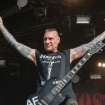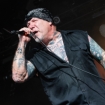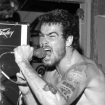When Roger Miret picks up Revolver's call in Arizona, he's already on his third cup of coffee. Needless to say, the Agnostic Front singer is alert and chatty. But it's not just the caffeine that has the vocalist wound up; it's also the release of Agnostic Front's latest record, The American Dream Died. "I just think I love the times that we're living in right now. This record is so relevant, real and genuine," says Miret. "It kind of feels like the time I wrote Victim in Pain."
While that groundbreaking 1984 hardcore album was rooted in political events of the era, according to Miret, politics has always been a big part of what his band is about. "From day one we've been singing about being anti-war, anti-society, anti-establishment. We fight oppression and overcome oppression. We're a people's band."
Indeed, on The American Dream Died Agnostic Front continue to be a band for the people. The 16-track record, which features Madball's Freddy Cricien, H2O's Toby Morse and Sick of it All's Lou Koller as guests on "Never Walk Alone," boasts the kind of blistering hardcore punk songs that fans have come to know and love from the New York stalwarts.
"I've been feeling for the first time in a long time super angry at stuff again. I have no problem writing songs about New York City or unity—I'm passionate about those things. But watching the world and what has going on in the past seven years, I've been super angry and I want to voice my opinion on it," Miret says. Revolver was only too happy to give him a soapbox from which to rant.
REVOLVER Why do you feel the American dream is dead?
ROGER MIRET I came from Cuba when I was four years old. My family was seeking the three big things this country stands for: Liberty, justice and freedom. I just feel little by little these three major things—and I'm not talking about material stuff—are being stripped away from you. Some of it is true, like that the housing market destroyed people and the economy. But there is so much injustice, and our rights are being taken away from us. My theory is 20 years from now they're going to look at the Constitution and not know what the fuck it is.
Coming from Cuba, what was it like growing up in America?
It was really hard. I was four, my brother was two, my sister was months old and my mother was 20. We wanted to get away from the Castro regime because we didn't agree with him. We came here and lived in poor neighborhoods. In school they put me in classes with slower kids until I learned how to speak English. I grew up in bad ways, but I went through it and fought it. I like to believe we're all in a better place now.
What was the inspiration behind the American Dream Died track "Enough Is Enough"?
Watching the news. I was doing some research on my computer, because the media is very biased toward a political party, whichever one it may be. I was just feeling like, "When is enough going to be enough? When are people going to fucking stand up for themselves? What's it going to take in this country for people to do something?" Apparently it's going to take a lot. It's like the Thomas Jefferson quote—a little rebellion is good.
On "Only in America" you talk about the military and what happens when service members come home from war. Why did you want to write about that?
That's another thing you get fed up with seeing. It's sad that when someone who has risked their life for your freedom, and dealt with all kinds of psychological or physical damage, comes home from war and they're out there on the fucking streets. Homeless vets. I can't understand why this country has this humongous homeless ratio. I travel the world and I don't see it unless they're squatters and they want to be homeless. I don't see a homeless German soldier. You may see it in a third world country, but America isn't a third world country. Then there's places like Detroit, where we say we can't help the people. But we've got millions of dollars—and I don't know where the hell it came from—for a war that we don't even want to be a part of. That's frustrating. There's all these greedy, corrupt politicians out there starting something to line their pockets and they don't give a shit about you, me or that homeless vet on the street.
Who is the old man in "A Wise Man"?
It was written about this old guy we knew. He died in '92 and he never had anything to do with this scene. But he looked out for us and our crimes [laughs]. He was a WWII veteran. When I sit back and think about everything he told us, he was like a Mafioso. I realized I learned so much from him, especially now that I've gotten older myself. I feel like I'm wiser, and I thank him for it.
What was some of his advice?
Keep your friends close, but your enemies closer. It was little things but he protected us from all the criminal activity we were doing and kept the streets clear until it was OK to go back out and be nuts again.
New York City was a different place back then, and in the song "Old New York" you say the city has lost its edge. Why do you think it's changed?
There was something about that scene back then—it had this element of danger you don't have anymore. I don't wish it to come back, because it was a horrible time. It takes a certain person to live by that way, get by and still be here. We were living amongst criminals and crazy people. The '80s all over America in this scene was a dangerous time. All the punk and hardcore shows were in the worst neighborhoods—you really had to want to go out there. That's gone. Now it's safe. I mean, it was gone when mom and dad dropped you off at a show [laughs], know what I mean? Shows wouldn't start until one A.M. and we were living amongst drug dealers and they got away with it. There were no cameras. All that being said, I miss it. I really do. I know New York is safe for tourists and they hiked up the prices on everything. You've got to be out of your mind to spend $400 a night in a hotel, but if that's what you want to do, that's fine. But that element of danger that you see in Taxi Driver, that's what created these great artists and great people. You had to learn to live with each other. You go to Little Italy and there's no families there anymore. All that being said, I have no problem leaving New York. The New York that I love and adore is in my mind.
Recently you said hardcore is "a movement, not an image." What does that mean to you?
When you wake up and look in the mirror, are you true to yourself? It's not about what you're going to wear or who you're going to associate with. I come from the old school. I mean, there was definitely a look and we were outcasts, of course. It was a direct link from the punk scene and if anybody tells you it's not, they're full of shit. But we didn't all what to be the same and look the same—that's boring. At the same time, we were a misfit family. I feel like hardcore is more important lyrically than it is musically. Of course music has a lot to do with it—it brings that aggression. It was like a dog growling and barking at you—nothing was pretty about it. We have nothing pretty to say and we were not pretty looking boys. I don't look like I did in 1982 but in my heart, when I wake up I'm the same person. And that's all that matters to me.
I heard you run a car club, can you tell us about it?
I'm an ambassador for Rumblers Car Club. Most of the chapters are pre-'60. It's Americana custom stuff. The thing about the guys in my club is that most of them are old hardcore punkers. Our cars are just as rowdy as our music—but they look good, too. The car I have been working on for the last eight years—yes, eight years—is a 1954 Chevy. It's all custom. My brothers here help me. The most beautiful thing about it is that what I don't know, someone else knows. I'm more of a mechanical guy and sometimes it's a body thing. So we all work together and get our cars together. That's my dream car.
Your American dream, right?
Yeah [laughs]. But it's no American dream, I'll tell you that much. But it's hard to make these dreams, of course. But what I'm really talking about is our constitutional rights—our freedom of speech that we still have. But they can spy on us at any time. They can take our guns if they want to. That's what the Nazis did to the Germans before they fucking took over. Little by little, we're headed to a police state. Maybe it's far-fetched, maybe it has a conspiracy edge, but those are my theories and beliefs. And if you don't think like I do, I don't think any less of you. I'm interested in your thoughts.








